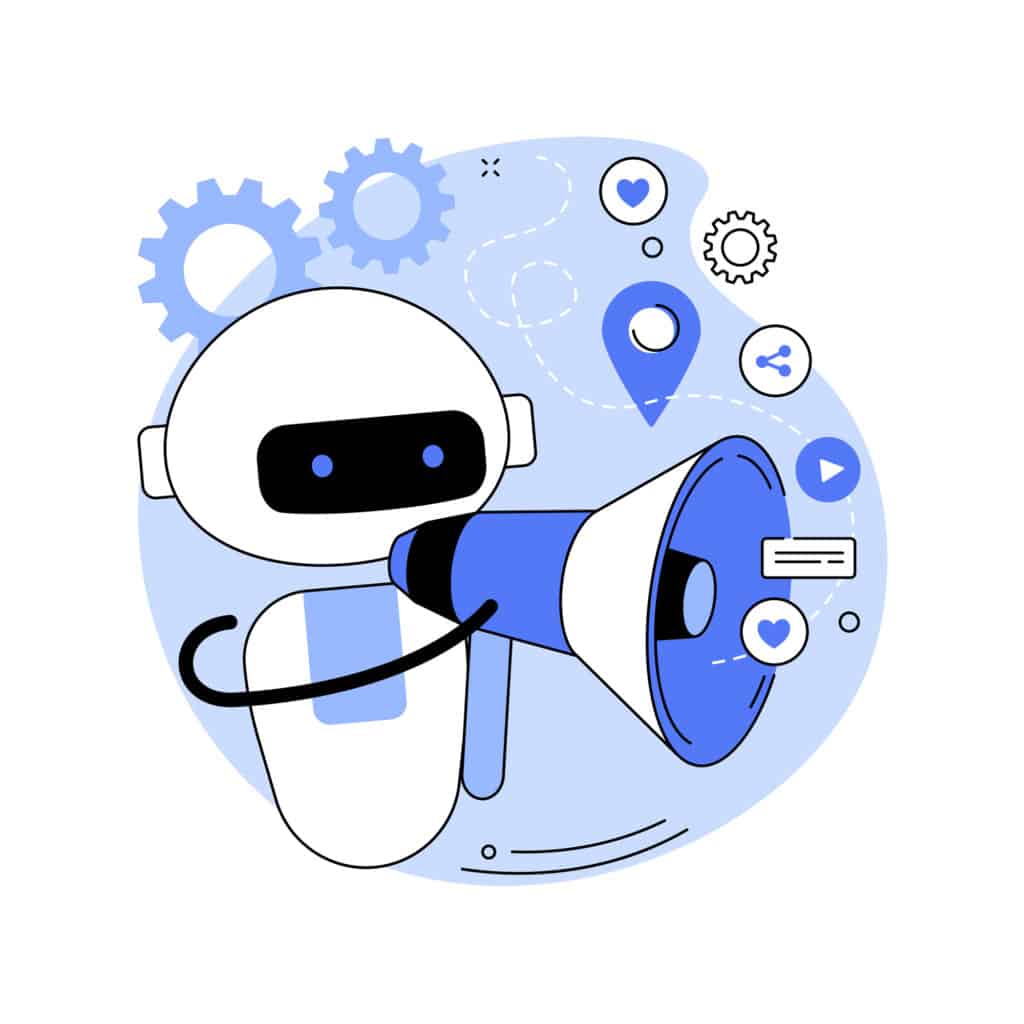
Practical Pros and Cons of AI Content Marketing

Looking at headlines about AI content marketing, it’s exciting to imagine the possibilities. When devising a strategy for a brand, though, you have to dig deeper. It’s important to examine how many of these AI applications are truly more efficient and effective.
AI has well-defined strengths and weaknesses that affect its applications in content marketing. Here are some practical pros and cons of content creation using AI.
Pro: AI Content Marketing Excels at Simple Tasks

AI is making waves in the content marketing world, and news outlets like Forbes are catching on. Tech such as chatbots and data analysis kits boost brand engagement in the online sphere.
Chatbots Keep Online Window Shoppers Engaged
Online shoppers used to have to page through dry information and technical specs to find the product that would best suit their needs. Alternatively, they would have to fill out complicated forms. Both tasks make online shopping feel like homework and turn off casual buyers.
Chatbots can act as a human employee and “talk” customers through these details and forms, eliminating the feeling of work. Though the AI prompts are simple, they can mimic a customer service rep accurately enough to answer the majority of consumers’ questions in a way that translates into sales.

AI Can Gather and Interpret Data To Guide Strategy
Computers literally run on data. They can process more information than humans on a much faster timeline, and thanks to AI, they can now organize that data in helpful ways and give suggestions. Research is an exciting new application for AI in the content marketing world.
AI content marketing is perfect for keyword analysis and predicting consumer trends with algorithms. It can also guide your content marketing strategy by setting up the most optimal trials (pitting one keyword against another and gauging results.)
Con: Complex Tasks Are Unsuitable for AI

If you separate an AI from data and scripted prompts, however, it tends not to perform as well. AI can cause more harm than benefit when given overly complicated tasks.
AI Works Within Strict Boundaries
The most advanced AI in the world still relies on programmers’ commands to guide output. Giving an AI more specific parameters increases the chances of a good result. Adding parameters works for some applications, but it comes with a drawback: AI can’t adapt to challenges outside of its narrow boundaries.
Think back to the chatbots. They’re great for guiding consumers through predetermined forms, but what if a customer has a question that hasn’t been coded into the prompts? A human employee must step in to ensure the customer stays happy and engaged.
Replacing an entire customer service department with chatbots may seem efficient on the surface, but in the long run, this strategy creates many more problems than it solves. Replacing all of your content marketing with AI is similarly unwise. The on-rails nature of AI programs would lead to a noticeable lack of engagement with your branded content.
Even the Best Content Created Using AI Isn’t Memorable

Getting an AI to write coherent paragraphs a portion of the time is a massive step forward for programmers. Naturally, some companies tout their AI content marketing as a complete solution for your brand.
Content marketing professionals, however, know that the internet is overflowing with lackluster copy: writing that makes sense, but does little else. If you want your brand to make an impact, the bar needs to be set higher than “coherent.”
What brings a piece of content from coherent to compelling? BKA Content has years of experience tackling this question. Short answer: all the elements AI struggles with.
1. Predictability. A great company blog can’t be predictable. Surprise and novelty are what keep readers paging through multiple articles, considering more of your products and services. Content creation using AI is designed to generate ordinary-sounding human writing, which means it avoids taking even small creative risks. This results in repetitive, dull content.
2. Humor and Irony. Compelling content often uses humor to make an impact. This can be overt humor in a more casual brand voice, but even in formal writing, it helps to subvert a reader’s expectations to keep them on their toes. A well-placed reference to a popular movie or a clever turn of phrase sticks in people’s minds, making them remember your brand over others in the category.
3. Emotional Appeal. Imagine your favorite product, and emotion is sure to bubble up. Nostalgia, fun, dependability — whatever you want to evoke. It’s crucial that people feel something specific when they think of your brand. AI is decades away from understanding what emotion is, let alone knowing how to evoke specific emotions in writing. That’s a task only a human can accomplish.
Need High-Quality Blogs With the Human Touch?
Our professional writers create original, engaging blog posts for businesses just like yours. Check out our blog writing services.
Pro: Content Creation Using AI Can Aid Writers
One of the most useful applications for AI content marketing is assisting human writers. With the power of AI, humans can write better content in far less time.
AI Can Help With Outlining and Planning

Outlines are to writers what pencil sketches are to painters: A foundation for the entire piece. Many writers find the outlining process more difficult and time-consuming than actually writing. It’s a high-pressure task that impacts every creative decision going forward.
AI content marketing programs can take the pressure off. AI is great at generating many short bits of hit-and-miss content, like headings and topic sentences. A writer can page through dozens of AI-generated headings, pick the four or five most promising ones, and have an outline in minutes.
AI Can Be a Great Sounding Board
Even the best writers get stuck from time to time. One simple transitional sentence can grind a writer to a halt if nothing seems to fit with the rest of the article.
AI can generate a slew of possibilities for this, as well. None of them are likely to be perfect, but chances are one will be close enough (or completely wrong enough) to inspire the writer and allow them to keep going.
Professional writers often have peer chat groups to act as sounding boards and help with difficult spots in their work. AI can step into this role, and unlike peers, it’s available and responsive 24/7.
AI Can Speed Up Editing

Programs like Grammarly and Pro Writing Aid are more than programmed lists of grammar rules. English grammar is famously complicated and case-dependent, to the point where it often makes no logical sense. It’s also constantly changing, with errors being adopted as correct over time.
Grammar and style check programs require advanced AI that teaches itself how to better interpret writing and give correct suggestions. Even then, these programs aren’t at the level of a professional human editor. They’re still useful for catching basic mistakes and helping writers save time while self-editing.
Con: AI Can’t Adjust to Changing Expectations
Content marketing is a rapidly evolving field, with consumer trends changing on a second-to-second basis. A set of infographics from Visual Capitalist shows just how much transpires in one “internet minute.” The takeaway? The internet is many things, but it’s never quiet.
Your marketing strategy needs to be flexible enough to pounce on new opportunities. It also needs to be able to weather changes in the perception of your company. Adaptability is beyond the reach of advanced AI content marketing and is one area where humans have the definitive edge.
Tone and Brand Image May Shift Over Time

Maybe a YouTube reviewer has introduced an entirely new audience to your product or service, or an experimental venture you’ve been testing has gotten big on TikTok.
Suddenly, you have a new demographic on your hands, and a limited window of time to adjust your strategy to accommodate them.
Human Writers Can Interpret Style Requests and Bridge Gaps
Humans understand these nuances and can better steer your branded content through tone changes quickly, unlike AI content creation. BKA Content account managers can work closely with your brand, communicating subtle but important distinctions to writers that will pivot your content in the right direction.
Need your blog to appeal to a younger audience? A writer can interpret that directive correctly the first time. By the time a programmer finishes teaching an AI what “lit” means, no one will be saying it.
Human writers can also help your brand evolve on a gradient, shifting subtly without alienating your existing audience. No AI can match a human writer’s flexibility and understanding of popular trends, both of which are vital to any content marketing strategy.
So, Does AI Content Marketing Work?

AI has many exciting applications in data analysis, and the small bits of content it creates can dramatically speed up the writing process.
However, AI isn’t capable of fully automating your content marketing. It can be tempting to rely on flashy new technology, but remember that the brain is the original supercomputer. AI content marketing is a useful tool, but complicated tasks like shifting tone, editing for style and flow, and evoking emotion are still best left to human writers.
Explore blog writing services from BKA Content for more information on how human writers can help your brand succeed.
Get Blogs Written By Humans Today
Our high-quality blogs can help with lead generation, brand authority and website traffic. Check out our blog writing services.
- How To Fix Broken Internal Links - December 12, 2024
- 10 Internal Linking Tools To Help With SEO - December 10, 2024
- Are Redirects Bad for SEO? - December 5, 2024

